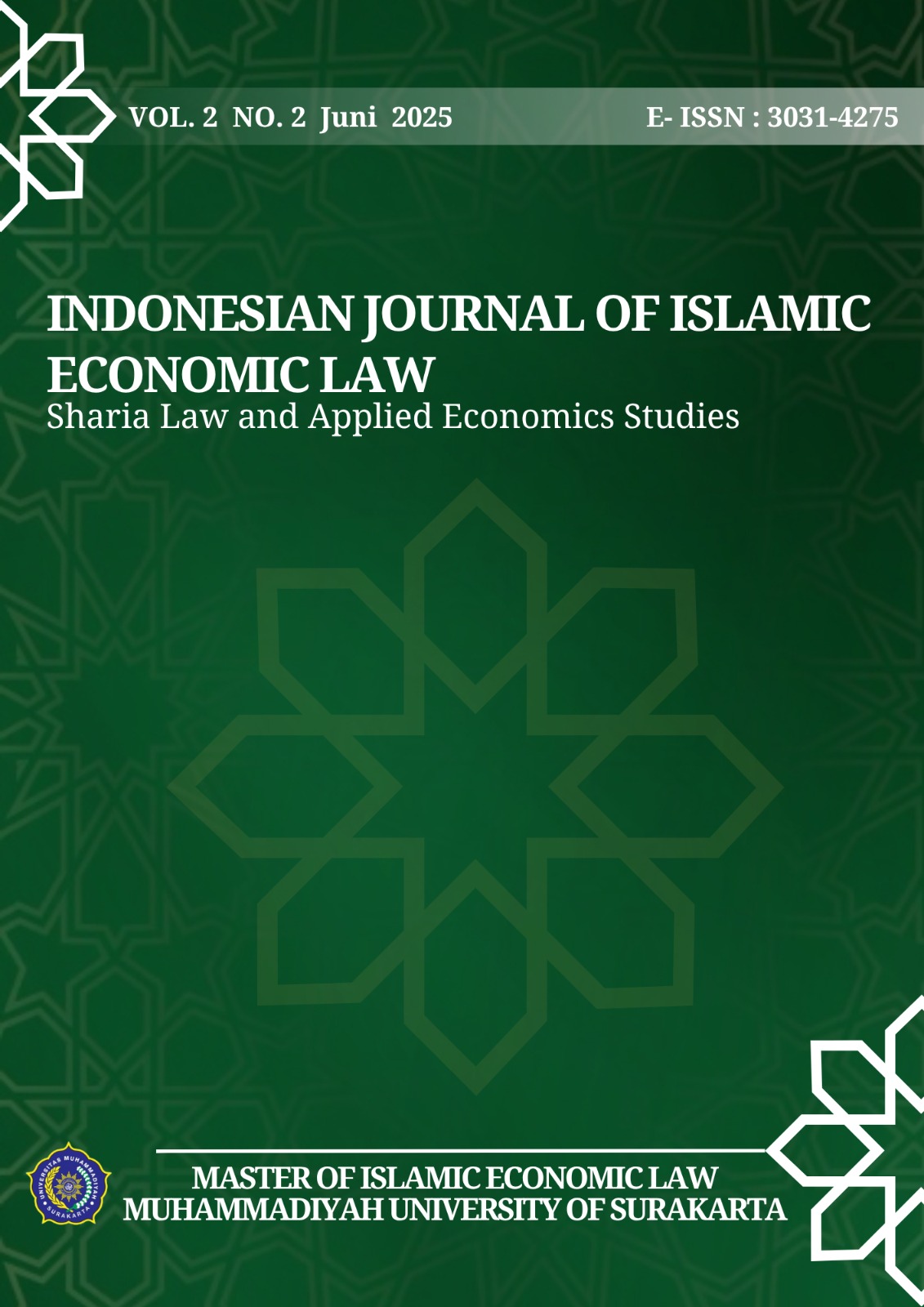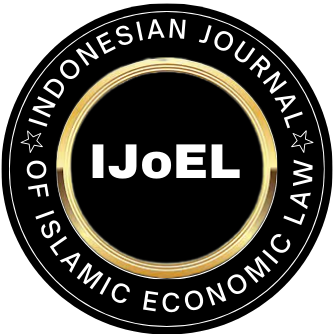Maqāṣid al-Sharī‘ah Insights on HDI and Islamic Economic Policy
DOI:
https://doi.org/10.23917/ijoel.v2i2.9943Keywords:
Human Development Index, Islamic Economics, Linear Regression Analysis, Maqāṣid al-Sharī‘ahAbstract
This study aims to analyse the influence of average years of schooling and life expectancy on Indonesia's Human Development Index (HDI) for the period 2021-2023 and its implications from an Islamic economic perspective based on maqāṣid al-Syarī'ah. This study employs a mixed-method approach, combining quantitative analysis through multiple linear regression tests to analyse the impact of average years of schooling and life expectancy on Indonesia's HDI for the 2021-2023 period, with qualitative analysis through content analysis from the perspective of maqāṣid al-Syarī‘ah. The results of this study indicate that average years of schooling and life expectancy have a positive and significant impact on the improvement of the Human Development Index (HDI) in Indonesia for the period 2021-2023, contributing 73.50 per cent to HDI variation. The increase in average years of schooling reflects improved access to education, thereby supporting workforce quality, while the stability of life expectancy indicates the success of healthcare services and improving living conditions for the population. From an Islamic economic perspective, these findings reinforce the connection between HDI indicators and the five objectives of maqāṣid al-Syarī‘ah, namely the protection of religion, life, intellect, lineage, and property, indicating that HDI improvement supports human development aligned with Sharia values. The implications of these findings underscore the importance of integrating education and health policies with environmental conservation policies to achieve a fair, sustainable, and prosperous Islamic economy for society.
Downloads
References
Abdulrahman Taresh, A., Dyah Wulan Sari, and Rudi Purwono. “Analysis of the Relationship between Income Inequality and Social Variables: Evidence from Indonesia.” Economics and Sociology 14, no. 1 (2021). https://doi.org/10.14254/2071-789X.2021/14-1/7.
Ahmad Yusuf, Ayus, Asmiyati Khusnul Maryam, Dinan Fathi Shiddieqy, and Abdelrehim Awad. “The Role of Sukuk Financing in Economic Growth and Poverty Reduction: Empirical Evidence from Selected ASEAN Countries.” Public and Municipal Finance 14, no. 2 (May 2025): 42–50. https://doi.org/10.21511/pmf.14(2).2025.04.
Akmal, I. K.Balyanda, M. Abd Shabri Majid, and Eddy Gunawan. “Does Zakat Matter for Human Development? An Empirical Evidence from Indonesia.” Regional Science Inquiry 12, no. 2 (2021).
Diynna Rahmawati, and Asnita Frida Sebayang. “Pengaruh Jumlah Penduduk, Indeks Pembangunan Manusia Dan Upah Minimum Provinsi Terhadap Kemiskinan Ekstrem.” Jurnal Riset Ilmu Ekonomi Dan Bisnis, 2023. https://doi.org/10.29313/jrieb.v3i2.2871.
Effendi, Prahara Lukito, Budisantoso Wirjodirdjo, and Sitta Izza Rosdaniah. “Cross-Country Comparison of Renewable Energy Governance and Market Structure: Based on Human Development Index and Ecological Footprint.” In 2023 5th International Conference on Management Science and Industrial Engineering, 342–47. New York, NY, USA: ACM, 2023. https://doi.org/10.1145/3603955.3603978.
Ernanto, Jaka Sriyana, Abdul Hakim, and Sahabudin Sidiq. “Enhancing Human Capital in Indonesia: Does Economic Policy Work?” International Journal of Sustainable Development and Planning 19, no. 5 (May 29, 2024): 1963–69. https://doi.org/10.18280/ijsdp.190535.
“Human Development Index from the Islamic Perspective: Roles of Taxation, Zakah, and Health and Education Expenditures.” Jurnal Ekonomi Malaysia 57, no. 01 (April 2023). https://doi.org/10.17576/JEM-2023-5701-08.
Isman, I, and Ahmad Zainul Muttaqin. “Innovative Legal Modeling for Interdisciplinary Studies on Law and Economic Behavior.” Indonesian Journal of Islamic Economic Law 1, no. 1 (December 7, 2023): 60–71. https://doi.org/10.23917/ijoel.v1i1.3437.
Lukman, Agus Eko Sujianto, Kania Dwiningtias, Awani Ceria Luksita, and Bagus Shandy Narmaditya. “Human Development Index, Good Governance Practice and Export: Evidence from ASEAN Countries.” Journal of Eastern European and Central Asian Research (JEECAR) 10, no. 3 (June 5, 2023): 468–77. https://doi.org/10.15549/jeecar.v10i3.1230.
Masduki, Uki, Wiwiek Rindayati, and Sri Mulatsih. “How Can Quality Regional Spending Reduce Poverty and Improve Human Development Index?” Journal of Asian Economics 82 (2022). https://doi.org/10.1016/j.asieco.2022.101515.
Miranti, Ragdad Cani, and Carlos Mendez. “Social and Economic Convergence Across Districts in Indonesia: A Spatial Econometric Approach.” Bulletin of Indonesian Economic Studies 59, no. 3 (September 2, 2023): 421–45. https://doi.org/10.1080/00074918.2022.2071415.
Miṣīlḥī, ‘Abd al-Fattāḥ bin Muḥammad. “Jāmi‘ Al-Masā’Il Wa Al-Qawā‘id Fī ‘Ilm Al-Uṣūl Wa Al-Maqāṣid.” Misr: Dār al-Lu’lu’ah li al-Nayhr wa al-Tawzī‘, 2002.
Prawoto, Nano, and Richa Dwi Cahyani. “Analysis of Unequal Distribution of Population Income in Indonesia.” The Journal of Asian Finance, Economics and Business 7, no. 7 (July 31, 2020): 489–95. https://doi.org/10.13106/jafeb.2020.vol7.no7.489.
Rahmawati, Farida, Fikita Putri Ananda, and Bagus Narmaditya. “Socio-Economic Indicators and Income Inequality: Lesson from West Java in Indonesia.” Scientific Papers of the University of Pardubice, Series D: Faculty of Economics and Administration 28, no. 3 (September 16, 2020). https://doi.org/10.46585/sp28031114.
Rahmawati, Yessi, Andiga Kusuma Nur Ichsan, Annisaa Rizky Dwi Brintanti, and Iqram Ramadhan Jamil. “Geo-Spatial Analysis: The Impact of Agriculture Productivity, Drought, and Irrigation on Poverty in East Java, Indonesia.” Letters in Spatial and Resource Sciences 16, no. 1 (2023). https://doi.org/10.1007/s12076-023-00348-6.
Rakhman, Fuad, and Singgih Wijayana. “Human Development and the Quality of Financial Reporting among the Local Governments in Indonesia.” Journal of International Accounting, Auditing and Taxation 56 (September 2024): 100634. https://doi.org/10.1016/j.intaccaudtax.2024.100634.
Risdayani, Risdayani, Muhammad Harsya Bachtiar, and Ahyarudin Ahyarudin. “Comparative Analysis of the Hiwalah Fatwa between Indonesia and Malaysia.” Indonesian Journal of Islamic Economic Law 1, no. 2 (June 30, 2024): 153–67. https://doi.org/10.23917/ijoel.v1i2.5507.
Risdayani, Risdayani, Isman Isman, Syamsul Hidayat, and Yusuf Rohmat Yanuri. “Maqāṣid Al-Syarī’ah Analysis of the Implementation of Food Social Assistance on Multidimensional Welfare in Indonesia (2020-2023).” AL-IKTISAB: Journal of Islamic Economic Law 8, no. 2 (November 5, 2024): 139–56. https://doi.org/10.21111/aliktisab.v8i2.12972.
Satrianto, Alpon, and Egy Juniardi. “Inclusive Human Development and Inclusive Green Growth: A Simultaneous Approach.” International Journal of Sustainable Development and Planning 18, no. 2 (February 28, 2023): 523–30. https://doi.org/10.18280/ijsdp.180221.
Sijabat, Rosdiana. “Impact of Economic Growth, Village Funds, and Poverty on Human Development in Indonesia: An Analytical Study from 2015 to 2022.” International Journal of Advanced and Applied Sciences 11, no. 3 (March 2024): 238–50. https://doi.org/10.21833/ijaas.2024.03.023.
Sofilda, Eleonora, Dida Nurhaida, and Muhammad Zilal Hamzah. “Foreign Direct Investment Experience in Middle Income Countries.” Cogent Economics & Finance 12, no. 1 (December 31, 2024). https://doi.org/10.1080/23322039.2024.2376951.
Sofilda, Eleonora, Muhammad Zilal Hamzah, and Ari Mulianta Ginting. “Analysis of Determining the Financial Inclusion Index of Composite, Conventional and Sharia Banking in Indonesia.” Banks and Bank Systems 17, no. 1 (February 2022): 38–48. https://doi.org/10.21511/bbs.17(1).2022.04.
Sukarniati, L, F R A Lubis, and N A A Zakiyyah. Ekonomi Pembangunan (Teori Dan Tantangan Di Negara Berkembang). Yogyakarta: UAD PRESS, 2021. https://books.google.com/books?hl=en&lr=&id=eAU_EAAAQBAJ&oi=fnd&pg=PR1&dq=ekonomi+pembangunan+teori+dan+praktik+di+negara+berkembang&ots=VBtwlJaXim&sig=MTJbUzkKXJzaXmu1a-WKH7qk_7M.
Suryanto, Suryanto, Evi Gravitiani, Diswandi Diswandi, and Arintoko Arintoko. “The Impact of Electricity Consumption to Human Development Index in Asian Countries: Analysis Panel Vector Error Correction Model.” International Journal of Energy Economics and Policy 13, no. 2 (March 24, 2023): 240–46. https://doi.org/10.32479/ijeep.13947.
Tjahjanto, Hadi, Tuhana Tuhana, Izza Mafruhah, Nurul Istiqomah, and Dewi Ismoyowati. “High Unemployment, Disrupted Economic Growth and Sustainable Development Goals: Analyzing Unemployment Reduction.” Economics and Sociology 16, no. 1 (2023). https://doi.org/10.14254/2071-789X.2023/16-1/7.
Triwibowo, Sugeng, and Nony Nurbasith. “Measuring Financial Inclusion in Indonesia: Asserting the Role of Digital Financial Services.” In Economics and Finance Readings: Selected Papers from Asia-Pacific Conference on Economics & Finance, 2022, 2023. https://doi.org/10.1007/978-981-99-1979-6_8.
Ulyati, Safridha, Adelia, Mutia Sabila, Khafia Mutia, Rahmawaty, Darwanis, and Heru Fahlevi. “Website Sustainability Disclosure, Government Size, and Human Development: Evidence from Indonesian Local Governments.” In 2024 ASU International Conference in Emerging Technologies for Sustainability and Intelligent Systems (ICETSIS), 1–5. IEEE, 2024. https://doi.org/10.1109/ICETSIS61505.2024.10459537.
Weik, L. “Understanding Inherent Influencing Factors to Digital Health Adoption in General Practices through a Mixed-Methods Analysis.” Npj Digital Medicine 7, no. 1 (2024). https://doi.org/10.1038/s41746-024-01049-0.
Widodo, Prima Ariyo, Isman Isman, Risdayani Risdayani, and Mamdukh Budiman. “The Effect of the Human Development Index on Environmental Performance Index Measurement: A Maqāṣid Al-Sharī’ah Perspective.” Al-Muamalat: Jurnal Ekonomi Syariah 12, no. 1 (January 31, 2025): 1–18. https://doi.org/10.15575/am.v12i1.40838.
Yunani, A. “Macroeconomic Indicators as Determinants of Fluctuating Natural Resource Commodity Prices: A Case of an Emerging Economy.” Studies, International Journal of Economics and Finance 14, no. 2 (2022): 399–419.
Downloads
Submitted
Accepted
Published
How to Cite
Issue
Section
License
Copyright (c) 2025 Prima Ariyo Widodo Arya, Risdayani Risdayani, Wahyu` Hidayat, Ahmad Raden Ali Tjenra

This work is licensed under a Creative Commons Attribution 4.0 International License.










